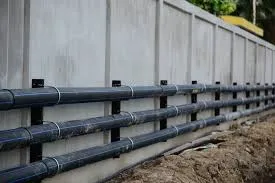Nov . 19, 2024 10:01 Back to list
flexible pvc irrigation pipe
Flexible PVC Irrigation Pipe A Comprehensive Overview
Irrigation is a critical component of agriculture, providing essential water supply for crops to thrive. With the continuous advancement in technology and materials, flexible PVC (Polyvinyl Chloride) irrigation pipes have gained prominence in modern farming practices. This article explores the features, benefits, applications, and environmental implications of using flexible PVC irrigation pipes.
What is Flexible PVC Pipe?
Flexible PVC irrigation pipe is a type of plastic piping made from polyvinyl chloride, a versatile thermoplastic material. Unlike rigid PVC pipes, flexible PVC pipes are designed to bend and conform to various shapes, making them adaptable for different irrigation systems. These pipes come in various diameters and lengths, allowing farmers and landscapers to customize their irrigation setups according to specific needs.
Key Features
1. Durability Flexible PVC irrigation pipes are resistant to corrosion and degradation, ensuring longevity even in harsh environmental conditions. They can withstand exposure to various chemicals and fertilizers, making them ideal for agricultural applications.
2. Flexibility As the name suggests, these pipes are flexible, allowing for easy installation in various terrains. They can be easily maneuvered around obstacles like trees, rocks, and uneven ground.
3. Lightweight Compared to rigid pipes, flexible PVC pipes are significantly lighter, making transportation and installation simpler and more cost-effective.
4. Smooth Interior Surface The smooth inner surface of flexible PVC pipes minimizes friction loss, promoting efficient water flow. This feature ensures a consistent water supply to crops, ultimately enhancing agricultural productivity.
5. Cost-Effectiveness The initial investment in flexible PVC irrigation pipes is often lower than that of traditional alternatives. Their durability also reduces maintenance costs over time, making them a financially viable option for farmers.
Applications
flexible pvc irrigation pipe

Flexible PVC irrigation pipes are utilized in a myriad of applications
1. Agricultural Irrigation From drip irrigation to sprinkler systems, flexible PVC pipes are widely used in farming to ensure crops receive adequate water. Their adaptability allows for tailored irrigation solutions specific to crop requirements.
2. Landscape Irrigation Gardeners and landscapers often use flexible PVC pipes for efficient irrigation systems in residential and commercial landscapes. The flexibility allows for creative designs to suit various layouts.
3. Fountains and Water Features Many water features rely on flexible PVC piping to facilitate circulation systems, ensuring optimal water flow and aesthetic appeal.
4. Hydroponics In hydroponic systems, where plants grow without soil, flexible PVC pipes deliver water and nutrients directly to the roots, promoting healthy plant growth.
Environmental Implications
While flexible PVC irrigation pipes offer numerous advantages, it is essential to consider their environmental impact. PVC is derived from petroleum, raising concerns about sustainability. However, when used effectively, these pipes can contribute to water conservation in agriculture. Efficient irrigation systems reduce water waste, helping preserve this precious resource.
Furthermore, flexible PVC pipes can be recycled. Many manufacturers have initiated programs to reclaim and recycle old pipes, reducing landfill contributions and promoting a circular economy in the agricultural sector.
Conclusion
Flexible PVC irrigation pipes represent a significant advancement in agricultural practices, combining durability, flexibility, and cost-effectiveness. Their versatile applications make them suitable for various irrigation methods, ensuring that crops receive the necessary water supply. Despite their environmental considerations, the efficient use of flexible PVC pipes can lead to sustainable farming practices that promote water conservation and enhance productivity. As agriculture continues to evolve, the role of innovative materials like flexible PVC will undoubtedly contribute to a more efficient and resilient agricultural future.
-
High-Quality PPR Pipes and Fittings Durable ERA PPR & PVC PPR Solutions
NewsJul.08,2025
-
Black HDPE Cutting Board - Durable, Non-Porous & Food Safe HDPE Plastic Cutting Board
NewsJul.08,2025
-
High-Quality CPVC Panel Durable HDPE & PVC Panels Supplier
NewsJul.08,2025
-
Double PE Welding Rod Supplier - High Strength, Durable & Versatile Welding Solutions
NewsJul.07,2025
-
High-Quality PVC-O Pipe Supplier Durable 75mm PVC Pipe & Connections Leading PVC Pipe Company
NewsJul.07,2025
-
HDPE Drainage Pipe Supplier – Durable & Corrosion-Resistant Solutions
NewsJul.06,2025

